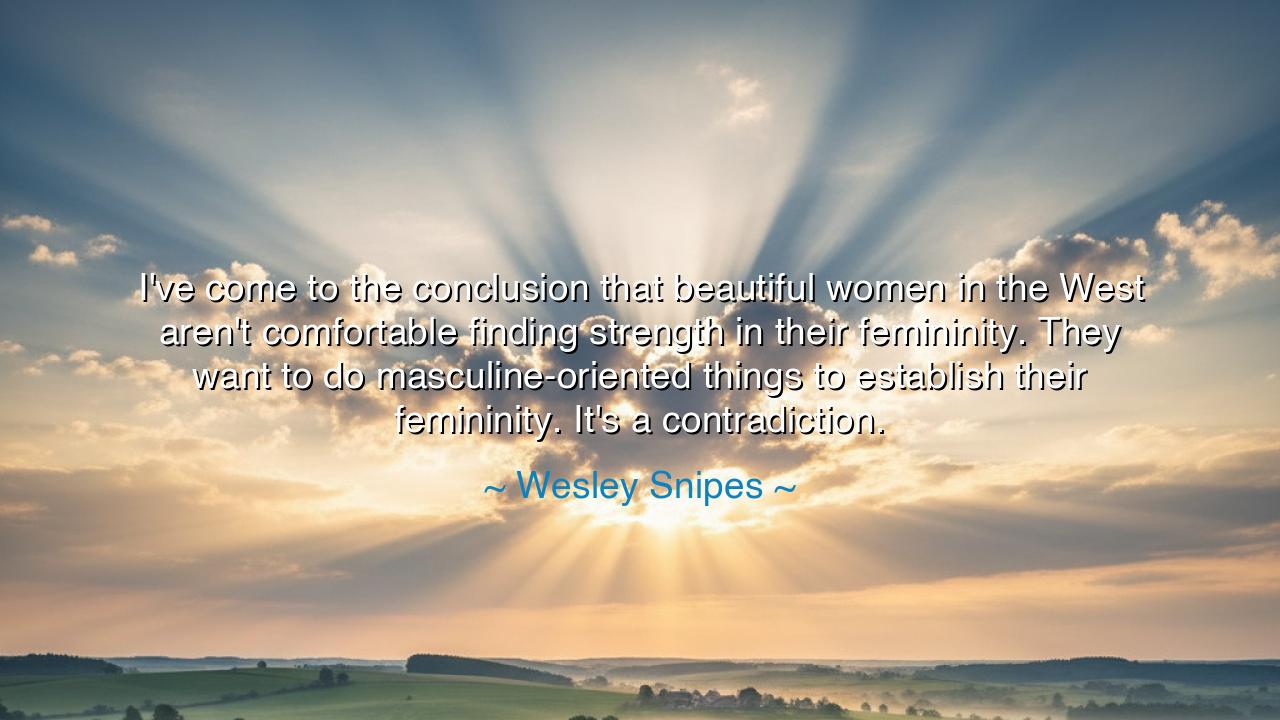
I've come to the conclusion that beautiful women in the West
I've come to the conclusion that beautiful women in the West aren't comfortable finding strength in their femininity. They want to do masculine-oriented things to establish their femininity. It's a contradiction.






"I've come to the conclusion that beautiful women in the West aren't comfortable finding strength in their femininity. They want to do masculine-oriented things to establish their femininity. It's a contradiction." Thus spoke Wesley Snipes, not as a philosopher of old, but as an artist reflecting upon the currents of modern culture. Yet in his words there lies an ancient struggle, one that mankind has wrestled with since the dawn of civilizations: the tension between what it means to be strong, what it means to be feminine, and how the two may coexist without being at war.
The ancients revered the dual powers of life. They knew that the lion and the dove are both symbols of strength, though their strength is different. Femininity was never seen as weakness—it was life-giving, sustaining, intuitive, and enduring. The Greeks honored Athena, goddess of wisdom and war, who ruled not with brute force but with strategy and reason. The Egyptians worshiped Isis, who embodied motherhood, healing, and magic. In these traditions, the strength of women did not require them to imitate men; it was distinct, radiant, and indispensable.
Snipes’ words reveal the contradiction of our age: that in trying to prove equality, some confuse equality with imitation. To pursue masculine-oriented things not out of genuine calling but out of fear of seeming weak is to betray the uniqueness of feminine strength. For true equality is not sameness—it is the recognition that the oak tree and the rose both possess power, though in different ways. The danger lies in forsaking one’s essence to adopt another’s, and in doing so, losing the beauty of what was meant to shine.
History offers examples both of imitation and authenticity. Consider Joan of Arc, who donned armor and led armies, stepping into a world of men. Yet her power was not in mimicking them, but in fusing her courage with her divine faith, her tenderness with her fire. She was not less a woman for leading as a soldier—she remained wholly herself. Contrast this with societies where women were forced to abandon their identity to gain acceptance, where to rise they had to shed their essence and adopt the mannerisms of men. In such places, greatness came, but often at the cost of inner peace.
The deeper meaning of Snipes’ reflection is that strength does not come from denial, but from acceptance. A woman is not made strong by denying her femininity, just as a man is not made strong by rejecting his masculinity. When each embraces their essence fully, the world gains balance. When each chases the other’s shadow, harmony collapses. The contradiction is not in seeking power, but in believing that one must borrow another’s form to validate one’s own.
The lesson here is timeless: know your essence, and find your strength within it. If you are called to build, build. If you are called to nurture, nurture. If you are called to fight, then fight—but let it flow from who you are, not from fear of how the world judges you. Femininity and masculinity are not enemies; they are mirrors, each reflecting the other’s light. To deny one is to dim the whole.
Practically, this means cultivating confidence in what you already are. For women, it may mean honoring the power of compassion, intuition, and grace, without thinking them lesser than courage or command. For men, it means respecting those same qualities in women without demanding that they prove themselves through imitation. And for all, it means remembering that the most authentic strength arises not from masks we wear, but from the truth we embody.
So let Snipes’ words be passed down, not as judgment, but as reflection: “Do not fear to find strength in your own nature. Do not seek to prove yourself by imitating another. For to deny your essence is the greatest contradiction of all.” Teach this to the next generation, that they may walk in authenticity, and that men and women, honoring their differences, may together build a world that is whole.






AAdministratorAdministrator
Welcome, honored guests. Please leave a comment, we will respond soon